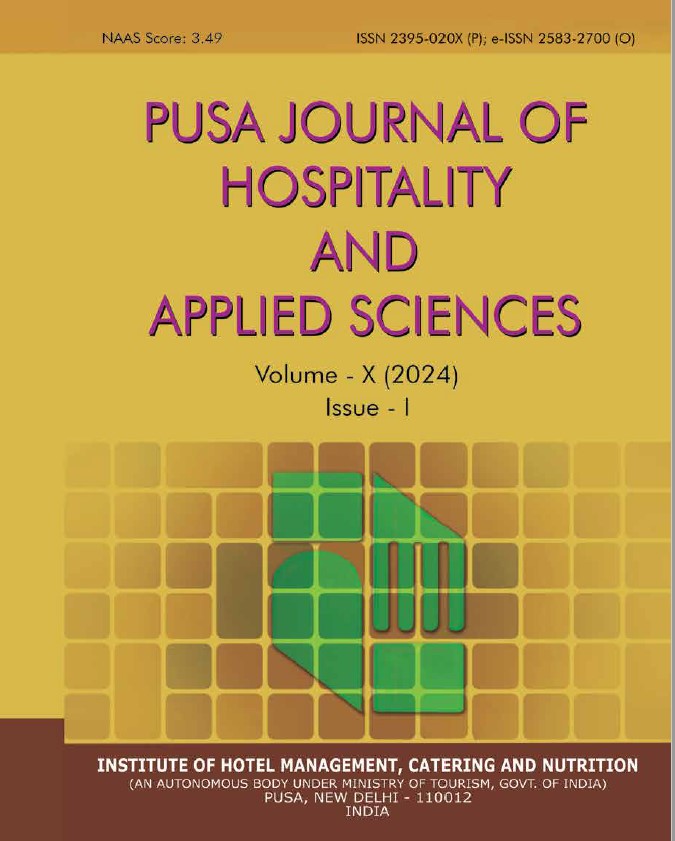A European - Australian Comparative Study on Competency Gaps in Chef Training: Implications for Chef Training in Australia
DOI:
https://doi.org/10.48165/pjhas.2025.11.1.1Keywords:
Chef training, competency gaps, graduate employability, integrative theoretical modelAbstract
Background: This study investigates the competency gaps in chef training in Australia by comparing it with European practices. Objective: It identifies competency gaps in Australian chef training programs particularly in foundational culinary techniques, business acumen and adaptability by comparing them with European practices and propose a model for improvements based on these findings Methodology: Employing a comparative qualitative design, this study gathered data through semi-structured interviews with 29 industry professionals in Europe and Australia. Thematic analysis, based on Costa's (2019) framework and drawing on Braun and Clark's (2006) approach, was used to analyze the data. Results: Based on the findings the proposed model emphasizes practical experience, a broader curriculum and a focus on mental resilience, aiming to enhance graduate employability and meet the evolving demands of the culinary industry. Conclusion: By addressing these gaps and adopting a more holistic approach, Australian chef training programs can better equip graduates for success in the evolving culinary landscape.References
Alvesson, M., & Sandberg, J. (2011). Generating research questions through problematization. Academy of Management Review, 36(2), 247–271.
Australian Quality Training Framework. (2013). Retrieved from: www.nssc.natese.gov.au
Billett, S. (2006). Constituting the workplace curriculum. Journal of Curriculum Studies, 38(1), 31–48.
Birdir, K., & Pearson, T. E. (2000). Research chefs’ competencies: a Delphi approach. International Journal of Contemporary Hospitality Management, 12(3), 205– 209.
Braun, V., & Clark, V. (2006). Using thematic analysis in psychology. Qualitative Research in Psychology, 3(2), 77–101.
Brown, J. S., Collins, A., & Duguid, P. (1989). Situated Cognition and the Culture of Learning. Educational Researcher, 18(1), 32–42.
Chapman, J.A. and Lovell, G. (2006), The competency model of hospitality service: why it doesn’t deliver. International Journal of Contemporary Hospitality Management, 18(1), 78-88. Conceptual Scheme. Educational Technology, 15(6), 19- 24.
Gourlay, L. (2009). Threshold practices: becoming a student through academic literacies. London Review of Education, 7(2), 181-192.
Jones, J., Manoharan, D. A., & Jiang, Z. (2022a). Occupational meaning, well-being and coping: A study of culturally and linguistically diverse hotel workers during COVID-19. Journal of Hospitality and Tourism Management, 52, 356-365.
Kalargyrou, V. and Woods, R. (2011). Wanted: training competencies for the twenty‐first century. International Journal of Contemporary Hospitality Management, 23(3), 361-376.
Ko, W. (2012). The relationships among professional competence, job satisfaction and career development confidence for chefs in taiwan. International Journal of Hospitality Management, 31(3), 1004-1011.
Kvale, S. (1996). Interview Views: An Introduction to Qualitative Research Interviewing. Thousand Oaks, CA: Sage Publications.
Manoharan, A., Gross, M. J., & Sardeshmukh, S. R. (2021a). Antecedents and Outcomes of a Culturally Diverse Workforce in Hotels. Journal of Hospitality & Tourism Research, 45(8), 1383–1416.
Mariampolski, A., Spears, M. C., & Vaden, A. G. (1980) What the Restaurant Manager Needs to Know: The Consensus. Cornell Hotel and Restaurant Administration Quarterly, 21(3), 77-81.
Marinakou, E. and Giousmpasoglou, C. (2020). Chefs’ competencies: a stakeholder’s perspective. Journal of Hospitality and Tourism Insights, 5(1), 205-229.
Mason, J. (2002). Qualitative Researching. 2nd Edition. London: Sage Publications.
Meyer, J. H., & Land, R. (2005). Threshold Concepts and Troublesome Knowledge (2): Epistemological Considerations and a Conceptual Framework for Teaching and Learning. Higher Education, 49, 373-388.
Nodine, T. R. (2016). How did we get here? A brief history of competency-based higher education in the United States. Competency-based Education, 1, 5-11.
Park, S. Y. & Millar, M. (2014). A Comparison of Hospitality Master’s Programs in North America, Australia, the United Kingdom and Europe. Journal of Hospitality and Tourism Education, 26, 198-203.
Pavesic, D. V. (1993). Hospitality education 2005: Curricular and programmatic trends. Hospitality Research Journal, 17(1), 285–294.
Sandberg, J. (2000). Understanding Human Competence at Work: An Interpretative Approach. Academy of Management Journal, 43(1), 9–25.
Sumanasiri, E. G. T., Yajid, M. S. A., & Khatibi, A. (2015). Conceptualizing learning and employability: Learning and employability framework. Journal of Education and Learning, 4(2), 53-63.
Teixeira, A., Bicalho, D., Slater, B., & Lima, T. (2020). Systematic review of instruments for assessing culinary skills in adults: what is the quality of their psychometric properties?. PloS one, 16(8), e0235182.
Tracy S. J. (2013). Qualitative methodology matters: Creating and communicating qualitative research with impact. Malden, MA: Wiley-Blackwell.
Wan, T., Hsu, Y., Wong, J., & Liu, S. (2017). Sustainable international tourist hotels: the role of the executive chef. International Journal of Contemporary Hospitality Management, 29(7), 1873-1891.
Whiddett, S., & Hollyforde, S. (2007). A practical guide to competencies: How to enhance individual and organisational performance. London: Chartered Institute of Personnel and Development.
Wilson, A. (1993). The promise of situated cognition. In S.B. Merriam (ed.), An Update on Adult Learning Theory (pp. 71-79). San Francisco, CA: Jossey-Bass.
Woodruffe, C. (1993). What Is Meant by a Competency? Leadership & Organization Development Journal, 14(1), 29-36.
Woolcock, C. (2011). To what extent does studying to become an australian trade-qualified cook prepare culinary students for further education?. Journal of Culinary Science & Technology, 9(4), 228-246.
Yorke, M. (2004). Employability in the Undergraduate Curriculum: Some Student Perspectives. European Journal of Education, 39(4), 409-427.
Zopiatis, A. (2010). Is it art or science? Chef’s competencies for success. International Journal of Hospitality Management, 29(3), 459–467.




